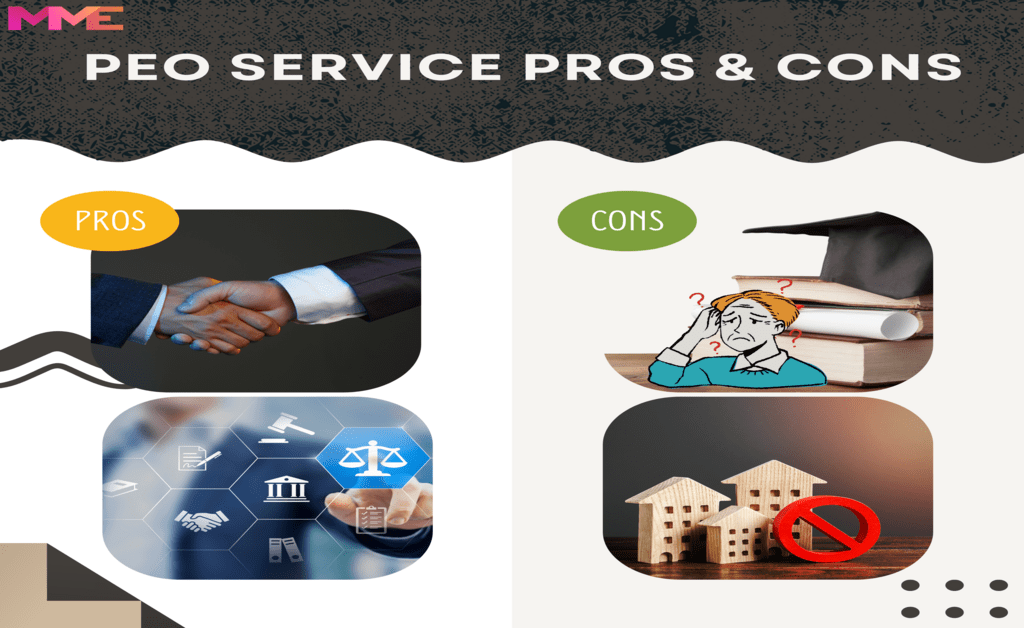PEO Services Pros and Cons: An Introduction

Do you need help managing your human resources as a small or medium-sized business? Professional Employer Organizations (PEOs) can be the solution. PEOs offer payroll, taxes, employee benefits management, and expert guidance on employment regulations. In this article, we’ll explore the PEO Services Pros and Cons and how they can save you time and money.
Partnering with a PEO brings comprehensive employee benefits, legal assistance, and improved performance management. However, concerns like losing internal control, perceived value, technology changes, and variable healthcare and business company should be addressed.
PEOs provide a significant advantage by allowing businesses to focus on core activities and save valuable time. Through collective purchasing power, they generate cost savings, making employee compensation and healthcare more affordable.
PEO Services Pros and Cons: What Is PEO?

Are you tired of juggling HR headaches? Enter the world of PEO services with this PEO Services Pros and Cons guide—a game-changer for businesses seeking relief. But what exactly is a PEO? It stands for a professional employer organization, your secret weapon in outsourcing essential HR administrative functions. Say goodbye to payroll stress, benefits hassle, workers’ compensation worries, and the labyrinth of employment laws.
PEOs assist in navigating workforce complexities with attractive service agreements, expert administrative services, and comprehensive HR assessments. They contribute to increased recruitment, employee engagement, and retention through recruitment assistance, employee handbooks, training, and guidance. PEO offers various services, including employee benefits, legal assistance, and improved performance management, saving valuable time.
In the comprehensive guide on PEO Services Pros and Cons, we’ll see how leveraging PEO enables your businesses to overcome challenges effectively.
How Do PEO Services Function?

When it comes to Professional Employer Organizations (PEOs), understanding how their services function is critical to making informed decisions for your business. Moving further in the guide on PEO Services Pros and Cons, let’s dive into the mechanics of PEO services and explore the various aspects that shape their functioning.
Client Service Agreement (CSA): The Foundation
The client company and the PEO establish a service contract known as the Client Service Agreement (CSA). This agreement sets the stage for their relationship and outlines the roles and responsibilities of each party.
Administrative Services and Support
Under the CSA, the PEO assumes certain administrative services while the client company remains the worksite employer. It allows the PEO to support the client’s in-house HR staff and teams, relieving them of certain HR-related burdens.
Client Company’s Core Responsibilities
The client company controls critical aspects such as employee management, hiring, and non-employee-related operations like sales, marketing, and customer service.
PEO’s Role in Payroll and Compliance
Another pro of PEO Services Pros and Cons is that it takes charge of processing employee wages, benefits, and withholdings. They also handle the remittance and reporting of taxes to relevant state and federal authorities throughout the CSA. Additionally, PEOs help clients maintain compliance with complex employment laws, offering risk management strategies and guidance on payroll tax laws, workers’ compensation, and employee relations issues.
Proactive Risk Management
An HR professional from the PEO Services Pros and Cons may collaborate with the client company to proactively address risk areas, ensuring smooth employee relations, accommodations, terminations, and other workplace-related matters.
Shared Tasks and Development of Policies
A PEO Services Pros and Cons is that specific tasks, such as developing an employee handbook, may be shared between the client company and the PEO, as defined in the CSA. This collaboration ensures the creation of comprehensive policies and procedures.
HR Support and Benefits Options
PEOs assist with a wide range of human resources functions, allowing businesses and their internal HR teams to concentrate on fostering a company culture and promoting employee engagement. Furthermore, the client company gains access to the PEO’s pool of benefits options, with support from their administration.
By understanding the PEO Services Pros and Cons, businesses can effectively leverage their expertise and support of PEOs to streamline their HR operations and optimize employee management.
PEO Services Pros and Cons: The Advantages

In this guide to PEO services and cons, we have covered what PEOs are and the services they offer. But what advantages can they bring to your business? Get ready to discover the eight key benefits of partnering with a Professional Employer Organization (PEO). Here they are:
Comprehensive Support
PEOs handle HR tasks and provide valuable advice to help businesses succeed. They assist with onboarding, training, and customer service, allowing organizations to focus on improving payroll.
Employee Benefits
One of the disbenefits of PEO Services Pros and Cons is that they leverage their collective employee pool to negotiate favorable health, dental, and life insurance rates. They handle employee enrollment, interactions with insurance companies, and benefits-related legal obligations.
Legal Support
PEOs assist with legal issues like payroll matters and time-off regulations. They have HR or legal professionals available to answer questions and mitigate risks. PEOs can navigate complex employment situations, ensure compliance with state regulations, and streamline decision-making processes.
Payroll Services
PEOs manage vacation accrual, tax withholding, and documentation in payroll operations. They offer pay stubs, digital W-2 forms, establish automated payroll systems with direct deposit, and ensure accurate calculations and record-keeping. PEOs may charge for each service individually or as a lump sum covering all payroll services.
Recruitment Assistance
One of the pros of PEO Services Pros and Cons is they assist organizations in finding suitable candidates for open positions. They assist in creating compelling job descriptions, training hiring managers, and handling salary negotiations. Some PEOs expand the talent pool by utilizing efficient job boards and networking channels.
Business Growth
Outsourcing HR functions to a PEO ensures businesses can focus on their core missions, productivity, and revenue generation. Quick access to qualified candidates enables prioritization of critical issues like client acquisition and deliverables.
Retirement Options
PEOs provide retirement benefits such as 401(k) plans, helping employees save for the future. These plans can enhance employee retention; with companies often matching worker contributions, employee contributions effectively double their savings.
PEO Services Pros and Cons: The Disadvantages

While PEOs bring numerous advantages, it’s crucial to understand the concerns surrounding internal control, perceived value, disruptions in processes and technology, as well as healthcare, workers’ compensation, and administrative costs. Make informed decisions about PEO partnerships by delving into these potential drawbacks.
More Internal Control
When weighing the PEO Services Pros and Cons, the loss of internal control is a significant concern. Business owners relinquish vendor selection autonomy, impacting choices related to workers’ compensation and health insurance carriers. Furthermore, aligning the company’s social values with those enforced by the PEO can pose challenges.
Diminished Perceived Value
Even though PEOs help businesses save money and add value by lowering insurance premiums and legal fees, some business owners may need to pay more attention to these advantages. Initially, PEOs bring undeniable financial advantages, saving costs on insurance premiums and legal fees. For small businesses, it’s a perfect fit. However, as your company expands, the equation shifts. Beyond 100 employees, maintaining an internal HR staff may become more cost-effective than ongoing PEO charges.
Process and technology disruptions
Partnering with a PEO can bring about the need for adjustments in a company’s technology platforms and processes. Overlooking innovation assumptions and outdated systems can hinder competitiveness and hamper recruitment efforts. With a comprehensive evaluation of technical requirements, PEOs can adapt to evolving accounting demands as businesses expand. Finding a PEO that effectively meets technology and process needs can be challenging for businesses, highlighting the importance of considering PEO Services Pros and Cons.
Administrative, Workers’ Compensation, and Health Care Costs
While PEOs can provide cost savings, the rates for healthcare and workers’ compensation vary based on your company’s needs and the PEO’s group plans. Factors like workforce demographics and claim history can impact these costs. Be cautious of potential higher charges or ineligibility for group plans. Additionally, consider administrative fees, such as per-employee or percentage-based charges.
PEO Services Pros and Cons: Top 5 Players In The Market

Dive into the world of Professional Employer Organizations (PEOs) and discover the top 5 market leaders. We’ll uncover the advantages and drawbacks they bring to the table, helping you make informed business decisions:
Husys
Husys is a trusted and privately held organization based in Hyderabad, Telangana. Since 2002, they have established themselves as India’s leading PEO provider. With a strong focus on small and medium-sized businesses (SMEs), Husys offers cost-effective HR services to over 3,000 organizations. Their wide range of solutions includes consulting, recruitment, employer-of-record services, business incubation, outplacement personnel solutions, organizational competency development, and talent acquisition.
MME
With over 27 years of experience, MME is a renowned Indian HR firm based in Delhi. They excel in professional employer organizations (PEOs), top management staff, payroll outsourcing, staffing, and international recruitment consulting. MME has gained global recognition for its expert services and owns a vast clientele. MME swiftly became a leader in the HR industry in 1994, expanding into international recruitment and PEO Services Pros and Cons. Their track record of efficient services has led to a strong reputation and a long list of satisfied clients.
Paysquare Consultancy Ltd.
With more than two decades of expertise, Paysquare delivers comprehensive services, from consolidating payroll inputs to processing tax reports and ensuring regulatory compliance. They aim to provide unparalleled value to HR and Finance teams, forging enduring partnerships. Standout features include innovative technology, secure login-based employee and client portals, hassle-free payroll management, and cutting-edge HR solutions.
Horizons
Horizons is a leading international Employer of Record (EOR) technology company that revolutionizes how businesses hire talent worldwide. Their innovative platform enables businesses to find top talent effortlessly while they handle compliance, payroll, and payment complexities in over 100 countries. From independent contractors to full-time employees, Horizons has become a trusted partner to over 2,000 businesses, offering a customer-centric approach to global hiring.
Staffio HR
Established in 2016, Staffio HR is a technology-driven job search and staffing company. With expertise in talent acquisition, CxO search, mid-management hiring, social media hiring, recruitment branding, and HR consulting, they simplify businesses’ challenges in managing human resources. It is renowned for exceptional customer service and industry knowledge. Staffio HR has earned a reputation as a reliable PEO Services Pros and Cons partner.
How To Choose the Best PEO Services for Your Company?

Choosing the best Professional Employer Organization (PEO) services for your company requires careful consideration and asking the right questions. By addressing key aspects, you can make an informed decision that aligns with your business needs. Here are some essential questions to ask before selecting a PEO.
What would you be paying for?
Professional employer organizations (PEOs) vary in costs and services. It’s crucial to understand what is included in those costs. A reliable PEO will offer support, strategic guidance, and access to benefits. While an investment, a PEO can save your business money and deliver over 27% ROI, with savings of around $1,800 per employee per year. Outsourcing HR functions to experts allows your team to focus on business growth, leading to a 40% greater median revenue growth for PEO clients.
How much would the PEO service cost?
PEOs typically charge a flat rate per employee or a percentage of the total payroll. The flat fee applies to each employee, while the percentage is based on paycheck amounts. When evaluating PEO Services Pros and Cons options, inquire about their billing process to avoid unexpected costs. Understanding the pricing structure upfront ensures transparency and helps you decide the best PEO service for your company.
What services would be included?
When choosing a PEO, one must inquire about the services included. PEOs typically offer various services, including HR consulting expertise for best practices, access to benefits beyond health and retirement plans, payroll services, and risk mitigation. Additionally, some PEOs provide supporting technology to enhance your business operations. Discussing the details of these services will help you determine which PEO can best meet your company’s needs and objectives.
What Software or Technology will they provide?
When evaluating PEO services, please inquire about the software or technology they offer. A reputable PEO will provide a robust HR platform accessible from various devices, enabling efficient management of HR functions. Request a platform preview to ensure it aligns with your business needs and can seamlessly integrate into your operations. Choosing a PEO with user-friendly and adaptable technology is vital for maximizing HR efficiency and streamlining processes.
Will the data be secure with the PEO?
When considering PEO Services Pros and Cons, data security becomes paramount. Can you trust that your sensitive personal information and your employees will be safeguarded? The question is whether they are committed to implementing advanced technologies and privacy practices to protect the data provided to them. How do they prioritize the security and confidentiality of your information?
Do they provide Professional and Training Development?
Optimal PEOs offer valuable ongoing training and development programs for employees. These resources attract top talent and maximize the potential of your workforce. Ongoing training is crucial for achieving business goals and increasing employee satisfaction. It demonstrates your commitment to employee growth and success. When considering a PEO, please inquire about the training tools and resources they offer to ensure they prioritize professional development for your employees.
Do they offer Employee Benefit Plans?
While considering PEO Services Pros and Cons, inquire whether the PEO offers comprehensive employee benefit plans. While most PEOs provide access to benefits, understanding the specific types of healthcare coverage is essential. Consider industry-specific benefits and whether the PEO can meet your employees’ needs. Regardless of business size, access to big-company benefits can enhance talent attraction and retention.
What Is the Cost Of Hiring A PEO Service?

Discovering the most cost-effective approach can be a game-changer for your business. Let’s explore two common fee structures PEOs use and understand how they calculate their charges.
Employee-Based Fee
Suppose your employees’ pay depends on variables like commissions; a monthly employee-based fee is calculated based on the number of employees in your company. This option is ideal for businesses with fluctuating employee compensation.
Payroll-Based Fees
Ranging from 2 to 12 per cent of your total payroll, the payroll-based fee is influenced by your organization’s size. This method is more beneficial when you have a consistent and stable payroll structure. It allows the PEO to determine annual costs with ease.
When considering the cost of hiring a PEO, various factors come into play. These include administrative services, HR training, recruitment activities, group health insurance plans, OSHA compliance, employee benefits administration, workers’ compensation, payroll administration, employment verification, and EEOC claims management.
How To Ensure You Are Not Overpaying?
While PEOs offer significant advantages, only some PEOs are equal in their rates, and with proper awareness, you might end up overpaying. Don’t fret! We’ve got you covered with this PEO Services Pros and Cons guide. We’ve bought five essential tips to secure the lowest price and maximize your PEO partnership.
Shop Around
Don’t settle for the first PEO that comes your way. Explore the market and gather quotes from 3-5 competitive PEOs. Leverage their need to attract new clients by negotiating pricing concessions based on your commitment.
Shop Financial First
Prioritize your budget before being wooed by services, technology, or personnel. Consider the costs of each aspect of the PEO offering to make informed, rational decisions.
Meet Underwriting Requirements
Providing accurate and comprehensive information is crucial. Incomplete details lead to assumptions, and worst-case scenarios often result in higher quotes. Control your privacy using Non-Disclosure Agreements (NDAs) and reference-based diligence.
Understand Price Locks
Price locks can be more valuable than discounts. If a PEO can guarantee a fixed medical renewal rate, it outweighs a reduction in administrative fees. Assess the long-term benefits and stability of the price lock.
Let’s Debunk 5 Common Myths Related To PEOs

Don’t let misconceptions cloud your judgment. Stay with us, and further in the article, ‘PEO Services Pros and Cons,’ we’ll debunk prevalent myths surrounding Professional Employer Organizations (PEOs), revealing the facts that will reshape your understanding of their benefits and potential impact on your business.
When working with a PEO, business owners lose control of their business!
According to this myth, business owners would lose control of their company and employees if they collaborated with a PEO. Nonetheless, this needs to be more accurate. Entrepreneurs keep up with complete control of their everyday tasks, including workforce choices, for example, recruiting and terminating. The PEO helps with overseeing HR and work documentation to guarantee consistency.
Is employee leasing and co-employment the same thing?
Some people mistakenly believe that employee leasing and a PEO relationship are the same. When clients collaborate with a PEO, their employees take on joint employment. Dissimilar to worker renting, where representatives are rented out to clients, a PEO keeps up with the client’s command over recruiting and other representative-related choices. Employees have two employers in a co-employment arrangement: the client company and the PEO, the employer of record.
It doesn’t matter if you are certified by the IRS or ESAC.
When selecting a PEO, it is essential to consider the ESAC Accreditation and IRS Certification (CPEO status) status. ESAC license guarantees that the PEO meets industry best practices and monetary unwavering quality guidelines. Select PEOs with IRS certification are designated as Certified Professional Employer Organizations, providing an additional standard and guarantee that you will work with a reputable company.
PEOs do not reduce HR costs?
PEOs, according to some business owners, are too expensive and do not help cut HR costs. However, NAPEO studies show employers can save up to 35% on HR administration costs by working with a PEO. Additionally, PEO Services Pros and Cons have the potential to assist in reducing employee turnover by 10% to 14%, thereby saving money on recruitment and hiring. Additionally, PEOs offer better employee benefit packages, potentially reducing healthcare costs.
My company needs to be more significant to benefit from a PEO!
A common misconception is that PEO services are only available to small businesses. PEOs, on the other hand, cater to businesses of all sizes. Some PEOs work with small start-ups with one employee, medium-sized businesses with hundreds of employees, and even larger businesses with over a thousand employees, although the number of employees required can vary.
HRO vs. PEO

Moving forward in our comprehensive guide, ‘PEO Services Pros and Cons,’ now we’ll discuss the differences between HRO and PEO so that you can make informed decisions.
Human Resources Outsourcing (HRO) involves entrusting specific HR processes, such as payroll, benefits administration, and recruitment, to a third-party provider. The client company retains control over its employees and employer responsibilities.
On the other hand, Professional Employer Organizations (PEOs) establish a co-employment relationship, assuming certain employer liabilities. PEOs handle payroll, PEO Services Pros and Cons, compliance, and risk management providing comprehensive HR services while sharing employment-related liabilities with the client. Unlike HRO, a PEO acts as a co-employer and sponsors health insurance and workers’ compensation.
Additionally, PEOs handle tax affairs under their own Employer Identification Number (EIN). In contrast, an HRO service operates as a separate third-party provider, offering services based on the client’s specific requirements. Understanding the distinctions between HRO and PEO is crucial in selecting the right HR outsourcing approach for your business.
ASO and PEO
Regarding outsourcing HR functions, two standard options are ASOs (Administrative Services Organizations) and PEOs (Professional Employer Organizations). While both provide HR support, there are distinct differences in the level of employer responsibility they assume.
ASOs serve as service providers, offering administrative support like payroll, benefits administration, and HR technology. They streamline processes and provide expertise, but employers retain their status and responsibilities.
On the other hand, PEOs establish a co-employment arrangement, becoming the official employer. They take on comprehensive HR services, including payroll, benefits, compliance, and risk management. PEOs function as an extension of the company, sharing employment-related liabilities.
One of the PEO Services Pros and Cons is that it benefits employees as legal employers, providing access to higher-quality, lower-cost insurance plans. They also handle tax remittances under their Employer Identification Number (EIN).
ASOs, not co-employers, focus on helping businesses obtain benefit plans and run payroll without remitting taxes under their own EIN or offering higher-quality healthcare plans. Understanding these distinctions is vital in determining which outsourcing model aligns with your business needs and goals.
Conclusion
Partnering with a Professional Employer Organization (PEO) for small and medium-sized businesses can be a game-changer. PEOs offer a range of benefits, from streamlined HR management to access to comprehensive employee benefits and expert legal advice. However, it’s essential to approach PEOs with a discerning eye.
While the advantages of PEOs are evident, assessing potential drawbacks is essential. Address concerns about loss of internal control, perceived value, and disruptions in business processes. Understanding the costs of PEO services, including pricing structures and additional offerings, and considering PEO Services Pros and Cons is crucial.
When selecting a PEO, consider the services provided, the scope of employee benefits, and the compatibility of technology systems. Businesses can make well-informed decisions by dispelling common misconceptions about PEOs, such as the fear of losing control or confusion around co-employment.
Ultimately, engaging with a PEO should be based on thoroughly analyzing the business’s unique needs and goals. By doing so, businesses can unlock the benefits of PEO services while mitigating potential risks. Embracing the right PEO partnership can empower businesses to focus on their core activities, achieve operational efficiency, and enhance their overall success in a competitive landscape.




